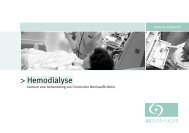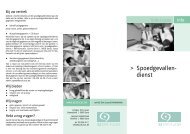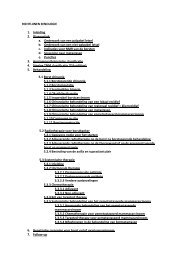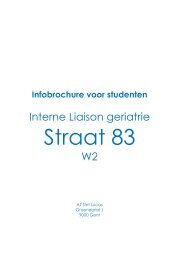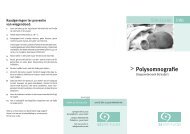Richtlijnen - AZ Sint-Lucas
Richtlijnen - AZ Sint-Lucas
Richtlijnen - AZ Sint-Lucas
Create successful ePaper yourself
Turn your PDF publications into a flip-book with our unique Google optimized e-Paper software.
c) Recommendations for the process of molecular evaluation of patients identified as being at<br />
risk, based on meeting the Bethesda guidelines<br />
Process of molecular evaluation:<br />
1. The optimal approach to evaluation is microsatellite instability (MSI) or immunohistochemical<br />
(IHC) analysis* of tumors, followed by germline MSH2/MLH1 testing in patients with MSI-H<br />
tumors or tumors with a loss of expression of one of the mismatch repair genes .<br />
2. After the mutation is identified, at-risk relatives should be referred for genetic counseling and<br />
tested if they wish.<br />
3. An alternative approach, if tissue testing is not feasible, is to proceed directly to germline<br />
analysis of the MSH2/MLH1 genes.<br />
4. If no mismatch repair gene mutation is found in a proband with an MSI-H tumor and/or clinical<br />
history of hereditary nonpolyposis colorectal cancer (HNPCC), the genetic test result is noninformative.<br />
The patients and the at-risk individuals (ie, relatives) should be counseled as if HNPCC<br />
was confirmed and high-risk surveillance should be undertaken.<br />
5. There is need to assure patients of confidentiality to allay fears related to discrimination based<br />
on genetic status.<br />
MSI-H: microsatellite instability-high in tumors refers to changes in two or more of the five<br />
National Cancer Institute (NCI)-recommended panels of microsatellite markers. MSI-L:<br />
microsatellite instability-low in tumors refers to changes in only one of the five NCI-recommended<br />
panels of microsatellite markers.<br />
* Standard mutation detection techniques include single-strand conformational polymorphism,<br />
denaturing gradient gel-electrophoresis analysis, and DNA sequencing. Alternative mutation<br />
detection techniques include monoallelic expression analysis, Southern analysis, and quantitative<br />
polymerase chain reaction; these methods may detect certain mutations such as large genomic<br />
rearrangements that may be missed by more conventional mutation detection methods.<br />
For families with a strong suspicion of HNPCC, germline testing should be considered, even when<br />
the MSI/IHC results indicate MSI-L, microsatellite stable, or normal expression. The likelihood of<br />
finding a germline mutation in the MLH1/MSH2 genes of patients with colorectal cancer tumors<br />
that are not MSI-H is expected to be low; however, this likelihood has not been thoroughly<br />
studied.<br />
BELEID testen HNPCC in <strong>AZ</strong>stLUCAS:<br />
a) Procedure voor stalen bij testen HNPCC: zowel dienst pathologie verwittigen als patiënt naar<br />
klinische biologie sturen voor bloedafname;<br />
- pathologie:<br />
stuurt stalen van de tumor naar pathologie UZ gent ( immuunhistochemie) en genetica ( is een<br />
aanvulling van immuunhistochemie, maar voor genetica is correlatie met niet-tumoraal DNA<br />
van de patiënt nodig, vandaar de bloedafname)<br />
- klinische biologie: op aanvraag duidelijk vermelden de reden van onderzoek ( HNPCC). Het<br />
staal wordt vandaar verstuurd naar Genetica UZ gent<br />
b) Genetic counceling:<br />
aangeboden via consultatie dr. Bruce Poppe




